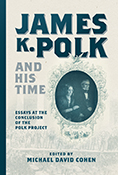James K. Polk and His Time
Essays at the Conclusion of the Polk Project

“This is a wonderful collection! I am particularly impressed by the amount of primary source detail evidenced in these essays.”—Walter Borneman, author of Polk: The Man Who Transformed the Presidency and America
________________________________
This collection arose out of a 2019 conference to commemorate the completion of the fourteen- volume Correspondence of James K. Polk. Its scholarship—which pays tribute to the Polk Project itself, as well as to the controversial nature of the Polk legacy—will result in a significant reinterpretation of the eleventh US president.
Contributors include John F. Polk, who examines the ways history has mischaracterized almost the entire Polk family tree, and Kelly Houston Jones, who investigates the family’s investments in slave-based agriculture. The fascinating life of Elias Polk, a man enslaved by the president, is compellingly related by Zacharie W. Kinslow. Asaf Almog analyzes the persistence of labels: Polk and fellow Democrats labeled their Whig opponents “Federalists,” he argues, with both rhetorical and substantive aims. Michael Gunther analyzes Polk’s authorization of the Smithsonian Institution and the Department of the Interior, seemingly at odds with his devotion to small government.
Taken together, the twelve essays unveil a more complex James K. Polk than the narrowly focused Jackson protégé and proponent of Manifest Destiny we often hear about. He was politically partisan but inspired by history and grounded in principle. His family’s long reliance on nonwhite Americans’ losses of freedom and land informed his policies on slavery and Indian removal, and the nature of the legislation at hand determined when he promoted a larger or a smaller federal government. James K. Polk and His Timehelps us to understand not only Polk himself and those who influenced him, but also those who felt the impact of his actions.
MICHAEL DAVID COHEN is a research professor and a faculty fellow at American University. He edited three volumes of the Correspondence of James K. Polk and is the author of Reconstructing the Campus: Higher Education and the American Civil War.
